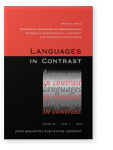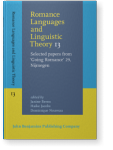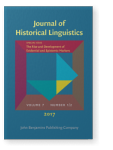Alice Corr
List of John Benjamins publications for which Alice Corr plays a role.
2022 Chapter 10. Interpreting reduplicated numerals in Old Ibero-Romance: A syntactic account Points of Convergence in Romance Linguistics: Papers selected from the 48th Linguistic Symposium on Romance Languages (LSRL 48), Toronto, 25-28 April 2018, Alboiu, Gabriela and Ruth King (eds.), pp. 177–192 | Chapter
Old Ibero-Romance reduplicated numerals in transfer and possession constructions force a distributive reading at the sentential level (OSp. los pecheros deben tres tres meajas “the taxpayers owe three
meajas
each”). I argue that the distributive construction is best accounted… read more
2018 ‘Exclamative’ and ‘quotative’ illocutionary complementisers in Catalan, European Portuguese and Spanish: A study in Ibero-Romance syntactic ‘near-synonymy’ Extending the notion of near-synonymy: Studies in morphological, syntactic and pragmatic equivalence, Enghels, Renata (ed.), pp. 69–98 | Article
The use of the Ibero-Romance complementiser que in non-embedded contexts with various illocutionary functions is argued to be non-trivially distinct from its canonical function as a marker of subordination. Interpretative and grammatical differences, and variation in the availability and… read more
2018 Matrix complementisers and ‘speech act’ syntax: Formalising insubordination in Catalan and Spanish Romance Languages and Linguistic Theory 13: Selected papers from ‘Going Romance’ 29, Nijmegen, Berns, Janine, Haike Jacobs and Dominique Nouveau (eds.), pp. 75–94 | Chapter
This paper discusses apparent cases of Catalan and Spanish non-embedded clauses headed by the subordinating complementiser que ‘that’, sometimes referred to in the literature as cases of insubordination (Evans 2007, 2009). Three interpretatively distinct types of ‘insubordinate’ que are identified,… read more
2017 The grammaticalization of epistemicity in Ibero-Romance: Alike processes, unlike outcomes The Rise and Development of Evidential and Epistemic Markers, Cruschina, Silvio and Eva-Maria Remberger (eds.), pp. 48–76 | Article
Typologically-unexpected overt expletives can be found in a restricted number of non-standard Ibero-Romance null-subject varieties. Historical data suggest that these overt expletives, which in today’s varieties show both discourse-oriented and expletive characteristics, have their origin in… read more



